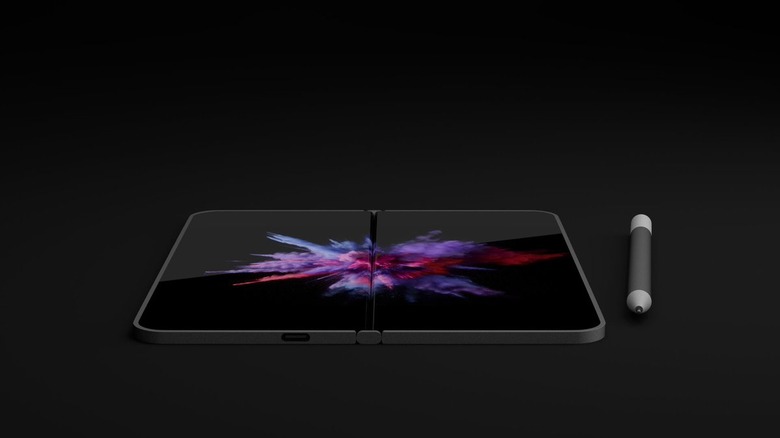The Biggest Competition For Samsung's Foldable Galaxy Phone Might Come From An Unexpected Place
Samsung's first foldable smartphone is confirmed to launch in the first half of the year, and the handset won't have that many rivals, as other vendors are yet to unveil their own foldable devices. But just because Samsung may not have that many competitors at first won't guarantee the success of the Galaxy F, which is what we're calling the device for the time being. Samsung's biggest worry when it comes to foldable phone sales might not be related to the phone's sky-high price or regular competitors from the mobile business. There may be a more significant threat to Samsung's success, and it could come from an unexpected company.
For years now we've been hearing that Microsoft is still working on a foldable "Surface Phone" type device that would run a version of Windows 10 in a new form factor for the Surface series. But those reports have increased in the past few months, and The Verge now says that Microsoft is indeed working on adapting Windows for foldable devices:
Sources familiar with Microsoft's plans tell The Verge that the software maker is making foldable devices and dual-screen hardware a big investment area for both Windows and Surface. This investment includes adapting Windows itself and its many built-in apps to work across foldable displays and devices with dual screens.
Previous reports told us that Microsoft is still working on its dual-screen hardware, codenamed Andromeda, and that other OEMs may develop Surface Phone-like hardware in the near future. But a new leak from earlier this week revealed that Microsoft has a team working on Windows for foldable devices.
10.0.18313.1004 (rs_shell_devices_foldables.190111-1800) https://t.co/Cw9g6i1Zz6 pic.twitter.com/NdclR2E0PR
— BuildFeed (@buildfeed) January 14, 2019
As it is right now, Microsoft doesn't have a mobile operating system. But Windows 10 is touch-friendly, and by making it work on foldable devices that could incorporate support for always-on 4G or 5G connectivity, Microsoft may get back into the mobile OS business.
For more than a year now, we've seen Windows laptop makers come up with more portable laptop versions built on components that were previously used to power Android smartphones and laptops. Those devices feature longer battery life, slimmer designs, and always-on connectivity. In other words, these devices could naturally evolve into foldable laptops. And adding phone features to highly portable, maybe even pocketable Windows 10 devices would make plenty of sense.
With that in mind, Windows 10 may be a tougher nut to crack for Samsung. It's one thing for the Galaxy F to compete against other foldable smartphones running Android, and quite another to compete against Windows 10-powered devices. While Samsung tries to come up with unique software features that would convince smartphone users to try the new form factor, Microsoft already has them. The company has in place an operating system that could work just as easily on a foldable phone/tablet as it does on an ultrabook. And some users may prefer Windows 10 over Android when it comes to computer operating systems that can be used for work and play. Google, of course, is working with Samsung on the folding phone's user interface. But Android tablets, which is what an unfolded Galaxy F will look like when it's unfolded, haven't exactly been a hit for Google and its partners.
Let's not forget that Samsung reportedly wants users to pay up to $2,000 for a foldable smartphone, which is incredibly expensive for a mobile device. That's the kind of money one would spend on a high-end laptop running either Windows 10 or macOS. And if Windows 10 device makers can come up with foldable laptop/smartphones of their own that would cost well under $2,000, then Samsung might have a tough job selling Android foldables.
On the other hand, Samsung also makes Windows computers and a recent report said the company is working on a foldable notebook of its own, a device that would likely be powered by Microsoft's operating system.
